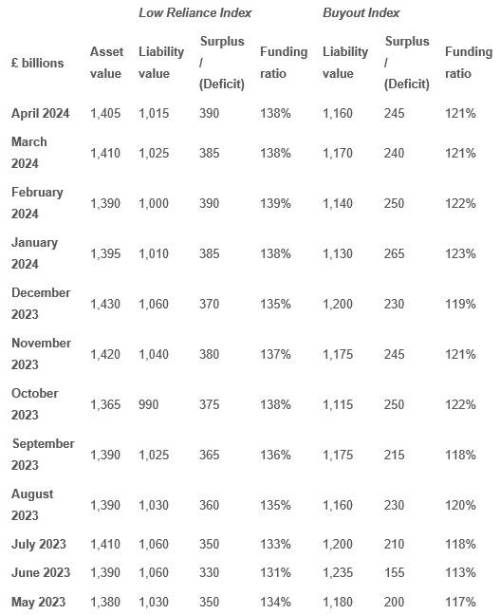PwC’s Low Reliance Index also continued to show a strong surplus of £390bn. This index assumes schemes invest in low-risk, income-generating assets like bonds, meaning they are unlikely to call on the sponsor for further funding.
As a result of sustained improvements in funding levels many schemes are considering stopping contributions from sponsors to avoid overfunding, and instead using the surplus to fund costs associated with the scheme.
John Dunn, head of pensions funding and transformation at PwC UK, said: “In many cases, sponsors and trustees have seen sustained or increasing surpluses in their pension schemes in recent months. For schemes where the sponsor is still making contributions, if no action is taken these will typically continue to be paid until they’re reassessed at the next triennial valuation. The question is whether that’s the right thing to do, for both the scheme and the sponsor. If there’s already enough money to achieve the scheme’s long term objectives, then putting more in could cause headaches further down the road - for example, deciding how excess surplus should be spent or overcoming hurdles to return it to the sponsor, after a tax charge.
“In light of improved funding levels, we’re seeing a clear trend in private sector DB schemes to cease sponsor contributions. For most schemes this will mean that the costs of running the scheme are paid for with the surplus - and for others where members are still building up benefits, it could include the sponsor’s share of the cost of those benefits too. This reduces the risk of overfunding, while ensuring that schemes are still funded prudently. If trustees do require additional security, separate vehicles can be used to keep some funds from the sponsor aside, which make it easier to deal with any excess above what is needed.”
Gareth Henty, pensions partner at PwC, added: “Although we are seeing a trend towards using pensions surpluses to meet costs in private sector schemes, we’re not yet seeing the same trend in the funded public sector schemes. These are dominated by the local government pension scheme, or LGPS, that provides pensions to employees of councils and other public bodies such as schools and colleges.
“The LGPS has built up a significant surplus over the last couple of years, which has yet to be used in any meaningful way to subsidise council’s costs and reduce the pension contribution burden on council workers. Contributions are not due to be formally recalculated until the next triennial valuation in 2025, and any changes would only be effective from 2026. It will be interesting to see whether well-funded local government schemes will follow the private sector in reducing (or even stopping) contributions - particularly given budget constraints among local authorities.”
The PwC Low Reliance Index and PwC Buyout Index figures are as follows:

|

